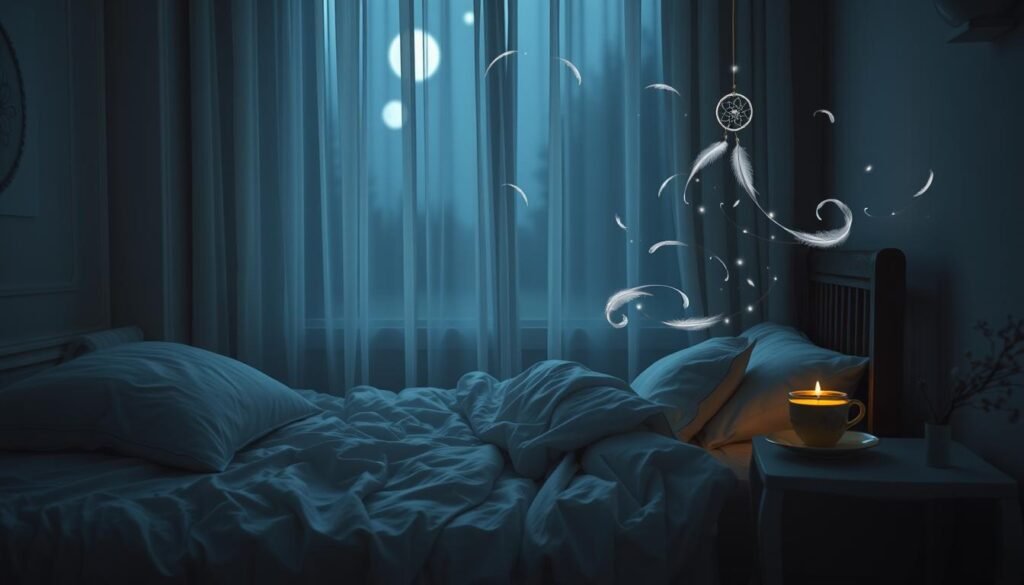Did you know up to 46% of people have sleep challenges before menopause? This shows how vital sleep is during this major life change. Not getting enough sleep can affect both your body and mind, causing anxiety and depression.
To cope with menopause sleep issues, it’s critical to have healthy sleep habits. Restful sleep helps improve your well-being during menopause. We’ll discuss factors that impact sleep at this time, why it’s important, and ways to sleep better.
Key Takeaways
- Sleep disorders during perimenopause may continue well into postmenopause.
- Postmenopausal women are at increased risk for sleep apnea compared to premenopausal women.
- Regular exercise contributes to easier and more sustained sleep for menopausal individuals.
- Hormonal changes during menopause can significantly disrupt sleep patterns.
- Lifestyle changes can help manage menopause-related sleep issues effectively.
Understanding Menopause and Sleep Disturbances
Menopause is a big change in a woman’s life, marked by the end of menstrual cycles due to hormone changes. Many struggle during this time, facing issues like menopause and sleep disturbances. About half of the women going through menopause have trouble sleeping, especially staying asleep or waking up too early.
Night sweats and hot flashes often cause sleep problems, making it hard to get a good night’s rest. Around 79% of women in menopause say they don’t sleep well. This shows that menopause and sleep deprivation can greatly affect a woman’s health. Cognitive behavioral therapy for insomnia is one method that can help improve sleep for these women.
Lifestyle also has a big impact on sleep during menopause. Stress, what you eat, and how much you exercise can make sleep issues worse. Many women try over-the-counter sleep aids, like melatonin, to sleep better. Not addressing these sleep problems can hurt heart health, so it’s crucial to deal with sleep disturbances in menopause.
| Research Findings | Percentage |
|---|---|
| Women reporting poor sleep quality | 79% |
| Women experiencing insomnia | 51% |
| Women at high risk for sleep apnea | 33% |
| Women who consider themselves night owls | 12% |
| Women reporting trouble sleeping | 50% |
The Importance of Sleep During Menopause
The importance of sleep during menopause grows clearer as women enter this stage. They often deal with sleep issues that impact their health. With nearly half struggling with sleep problems before menopause, it’s vital to tackle poor sleep early.
Health Implications of Sleep Disruptions
Sleep troubles can cause serious health problems, like obesity, heart issues, and memory problems. For example, after menopause, many women face sleep disorders. Hot flashes and night sweats, affecting 80% of these women, make it worse.
Conditions like insomnia and sleep apnea add to these concerns. The impact of sleep issues goes beyond just being tired. They hurt job performance and mood.
Quality of Life Considerations
Good sleep is crucial for a happy life during menopause. Lack of sleep can lead to mood swings, stress, and depression, which is common in this phase. Taking steps like exercising for 150 minutes a week and relaxation can lower sleep problems significantly.
These actions boost mood and health. Watching what you eat and drink can help too, as caffeine and alcohol might worsen sleep. Making these changes can greatly enhance menopause experience and life quality.
Common Sleep Problems Associated with Menopause
Many women going through menopause face sleep issues that impact their life. A big problem is waking up at night. This often comes from changes in hormones and symptoms like hot flashes. Such sleep breaks make it hard to get a good night’s rest.
Nighttime Awakenings
A lot of menopausal women wake up often during the night. Research shows that 75%-85% have hot flashes for years. These make it tough to stay asleep, making you tired the next day. This leads to a cycle of waking often, which makes you even more tired and cranky.
Difficulties Falling Asleep
Along with waking up a lot, falling asleep can be hard. The National Sleep Foundation says about 61% of women in menopause have this issue. This is due to changes in hormones like estrogen and progesterone. These changes can cause insomnia. Cooling down your room and trying to relax before bed may help. For tips on handling these sleep problems, visit managing sleep disturbances during menopause.
Hormonal Changes and Their Impact on Sleep
During menopause, women go through big hormonal changes. This affects their estrogen and follicle stimulating hormone (FSH) levels a lot. These changes can really impact how well a woman sleeps. It’s important to understand this link to better manage sleep problems during menopause.
Fluctuation in Estrogen Levels
As menopause nears, a woman’s estrogen levels start to vary and then go down. This drop in hormone levels can cause mood changes and trouble sleeping. Women might find it hard to stay asleep, wake up often at night, and feel restless. In fact, 40-60% of women facing menopause report having sleep issues. This shows why it’s crucial to know about these changes and find ways to deal with them.
Role of Follicle Stimulating Hormone (FSH)
When FSH levels go up during menopause, it has a big effect on sleep. Higher FSH levels can make it hard for women to fall asleep and lead to waking up many times at night. This highlights why keeping an eye on FSH levels is key during this time. About 61% of women going through perimenopause or menopause deal with insomnia. Plus, up to 80% of women suffer from hot flashes and night sweats for years, making sleeping well even harder.
| Aspect | Details |
|---|---|
| Prevalence of Sleep Problems | 40-60% of menopausal women |
| Occurrence of Hot Flashes | 36-87% of midlife women |
| Duration of Vasomotor Symptoms | Median: 7.4 years; some more than 10 years |
| Insomnia in Menopausal Women | 61% experience insomnia |
| Impact of FSH Levels | Increased difficulty with sleep disturbances |

To wrap it up, hormonal changes and sleep issues are closely connected during menopause. Understanding these changes helps manage sleep better, improving women’s lives during this time. To learn how hormonal shifts during ovulation can also make you tired, click here.
Vasomotor Symptoms and Sleep Disturbances
Hot flashes and night sweats greatly affect sleep during menopause. Up to 80% of women have these symptoms, leading to disrupted sleep. They often wake up, which affects how well they can function during the day.
The severity of hot flashes and sweats affects sleep quality. Research shows 83.1% of women feel less productive due to sleep problems from these symptoms. About 90.8% say these symptoms make their sleep worse.
Women with severe symptoms score around 59.8 on sleep assessments, much higher than the general 50 score. Those with frequent hot flashes often have interrupted sleep. This can cause long-term insomnia and other sleep issues.
| Severity of Vasomotor Symptoms | Percentage Experiencing Sleep Disturbances | Associated T Score (Sleep Disturbance) |
|---|---|---|
| Mild | 38% reported sleep disturbances | 49.2 |
| Moderate | 60% reported sleep disturbances | 54.6 |
| Severe | 80% reported sleep disturbances | 59.8 |
Women with moderate to severe symptoms face issues like insomnia. This is common during perimenopause and postmenopause. It’s important to address these symptoms. Changing lifestyle and diet, and sometimes seeking medical help, can improve sleep. This can make daily life better.
Understanding Sleep Disorders in Menopausal Women
Sleep issues are very common during menopause, affecting lots of women. Almost half encounter sleep problems. This affects their day and night. Menopause can bring on insomnia, sleep apnea, and restless legs. These issues are often due to hormonal changes and other physical shifts.
Prevalence of Sleep Apnea
About 35.2% of women in postmenopause face sleep apnea. This is likely due to dropping estrogen levels. These changes can affect breathing. Sleep problems, including apnea, become more common. Over 60% of menopausal women report such issues. Hot flashes and hormonal changes are often blamed.
Anxiety and Depression as Factors
Menopause can raise the risk of anxiety and depression. This makes sleep problems worse. Hormonal changes can increase stress. This leads to high cortisol levels at night, harming sleep. It’s important to understand how mental health affects menopause and sleep. Addressing these can help improve life quality in this phase. For more information, visit this resource on sleep disturbance during.

Tips for Better Sleep During Menopause
Menopause brings its own set of sleep challenges. One great tip for better rest is sticking to a regular sleep schedule. Tips for better sleep in menopause include going to bed and waking up at the same times every day. This tells your body it’s time to rest, improving your sleep quality.
Establishing a Sleep Routine
To sleep better, create a calm setting before bed. Try relaxing activities such as reading or listening to soft music. It’s also important to avoid looking at screens before bedtime, as the light can disrupt sleep hormones.
Importance of Exercise
Exercise is vital for good sleep during menopause. It’s proven to ease insomnia and improve rest. Activities like walking or swimming, along with strength exercises, make sleep easier to come by. Aim for 150 minutes of such exercises every week, preferably earlier in the day. Exercise helps your body cool down at night, improving sleep.
It’s crucial to keep a sleep-friendly bedroom too. Adjust your room to a cool temperature, around 66 to 68 degrees F, to ease night sweats. These changes are a big help for menopause sleep issues. For more advice, check out this detailed guide on creating a bedtime routine.
| Tip | Description | Benefits |
|---|---|---|
| Consistent Sleep Schedule | Go to bed and wake up at the same times | Stabilizes internal clock |
| Relaxing Bedtime Rituals | Engage in calming activities before sleep | Promotes relaxation |
| Avoid Electronics | Limit screen time 1 hour before bed | Supports melatonin production |
| Regular Exercise | Engage in at least 150 minutes of aerobic exercise weekly | Reduces insomnia severity |
| Cool Bedroom Environment | Keep bedroom temperature between 66-68°F | Reduces hot flashes and night sweats |
Natural Remedies for Menopause Insomnia
Many women find that menopause insomnia remedies greatly improve their sleep. There are natural options like herbs, acupuncture, and mindfulness that can help. These methods offer hope for better sleep during menopause.
Herbal Supplements and Alternatives
Ashwagandha is a popular herb for menopause insomnia. A study found that taking 600mg each day improved sleep and lessened anxiety. Chamomile also helps people fall asleep faster and stay asleep longer.
Valerian root and lemon balm may improve sleep quality. Passionflower and tart cherry juice can benefit sleep and increase melatonin. Magnesium is helpful too, especially since many older adults lack it.
Acupuncture and Mindfulness Techniques
Acupuncture is good for sleeping better during menopause. It can balance hormones, easing insomnia. Techniques like meditation and deep breathing reduce stress and improve sleep.
Using a mix of these menopause insomnia remedies can be very effective. A focus on relaxation and natural treatments is beneficial for women in menopause.

| Herbal Remedy | Benefit | Recommended Dosage |
|---|---|---|
| Ashwagandha | Improves sleep and reduces anxiety | 250-600mg daily |
| Chamomile | Quicker sleep onset and longer duration | Varies by product |
| Valerian Root | May enhance sleep quality | Varies; consult product label |
| Lemon Balm | Improves sleep quality in some users | 250mg twice daily |
| Magnesium | Enhances sleep duration and quality | Varies; consult healthcare provider |
The Role of Medical Interventions
Many women struggle with sleep problems during menopause. This can deeply affect their daily lives. In such cases, things like hormone therapy and certain meds are key. They help manage these issues, easing discomfort.
This not only brings relief but also makes life better for those with sleep troubles tied to menopause.
Hormone Replacement Therapy
Hormone replacement therapy (HRT) is advised to tackle the sleep disruption caused by hormonal changes. It improves sleep by easing menopause symptoms like hot flashes and mood swings. HRT adjusts estrogen and progesterone levels. This might lessen insomnia and related problems.
Although many women see better sleep with HRT, results can differ from person to person.
Medications to Aid Sleep
Beyond HRT, there are meds specifically for menopause sleep issues that offer quick relief. SSRIs, for example, help with sleep troubles linked to hormone shifts. Melatonin, an over-the-counter aid, works as a short-term fix but doesn’t tackle menopause’s root causes.
If sleep issues persist and impact daily life, it’s vital to talk to doctors. They can suggest the best meds and treatments.
| Treatment Option | Type | Effectiveness |
|---|---|---|
| Hormone Replacement Therapy | Prescription | Helps alleviate hot flashes, improves sleep quality |
| Selective Serotonin Reuptake Inhibitors (SSRIs) | Prescription | Effective for mood-related sleep disturbances |
| Melatonin | Over-the-Counter | May reduce time to fall asleep, limited long-term effects |
Each woman’s menopause experience is different. Knowing how meds and therapy help allows them to choose wisely for their health and sleep well-being.
Conclusion
Sleep plays a key role for women during menopause. It affects their overall well-being. Many face sleep problems due to hormonal changes and health issues. It’s important to know the value of good sleep and find ways to improve it.
Studies show menopausal women have more sleep issues than before menopause. They also deal with emotional ups and downs. Short sleep can lead to more depression. Making changes to lifestyle, trying natural remedies, and seeking medical help are good steps. These can help women sleep better.
Exploring different options can empower women in menopause. By focusing on sleep and understanding its impact, they can live healthier and happier. Good sleep leads to balanced life and better mental health.